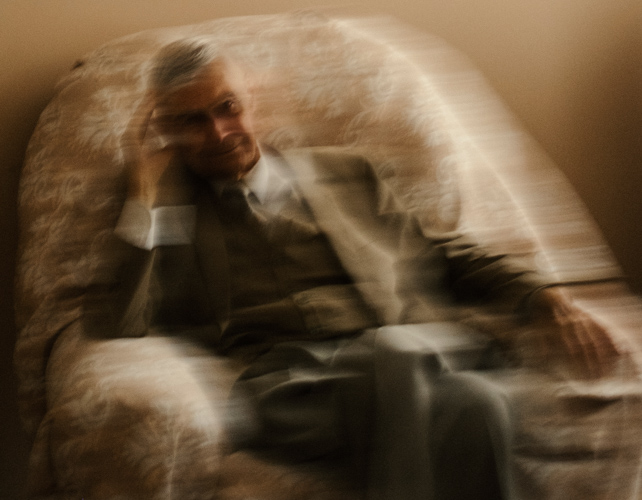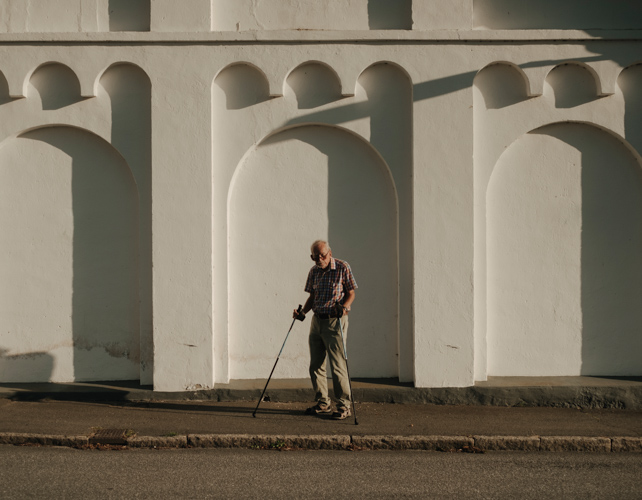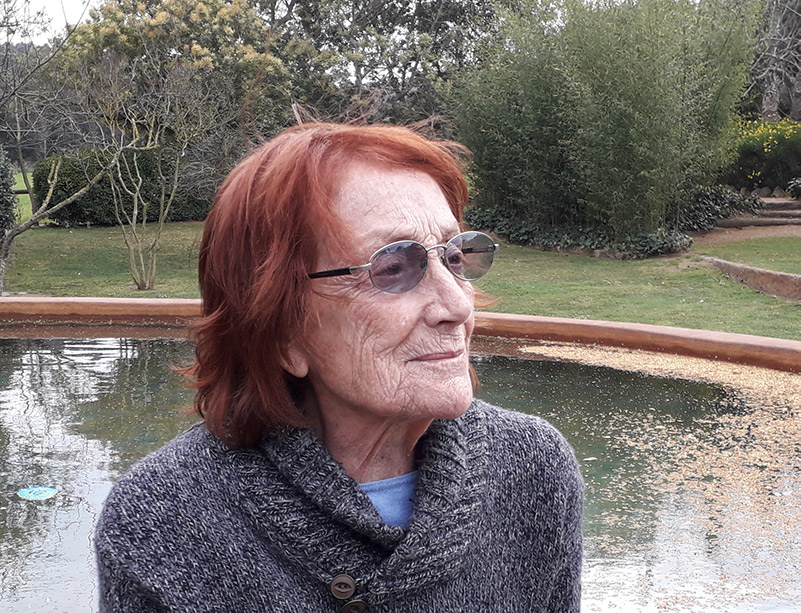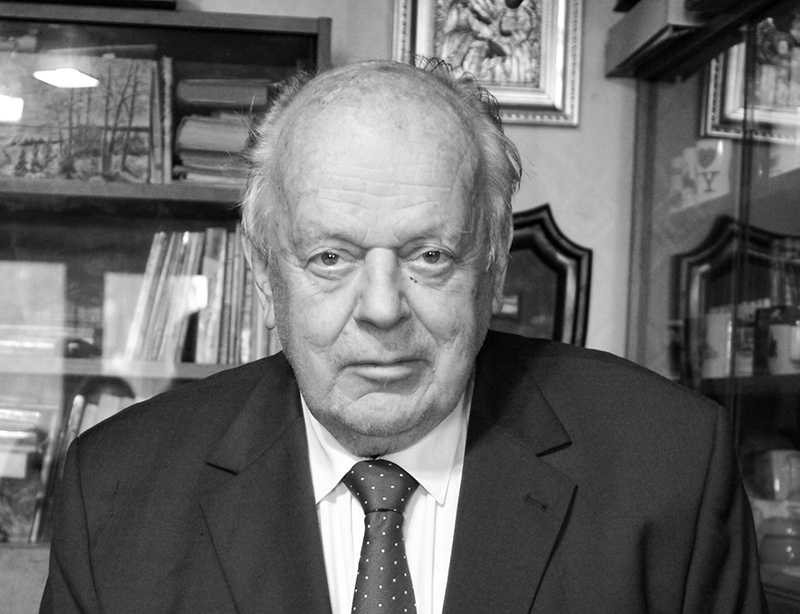Oleh Panchuk was born 1932 in Chernivtsi, as grandson of the Ukrainian writer Olha Kobyljanska. Panchuk was a professor at the Faculty of Chemistry, and even today, at the age of 87 he is still teaching. Oleh Panchuk was also active in the democratic and independence movement in Ukraine, and was one of the founders of the People’s Movement in Bukovina.
In this interview, Panchuk tells us about how the Soviet authorities instrumentalised his grandmother, the important lessons in civic duty that he learned from his older brother, his views on the protests on the Maiden, as well as the happy discovery of our interviewer, Evgenia, being one of the students who benefited from the Germany-Bukovina cultural exchange programme that Panchuk helped set up many years ago.
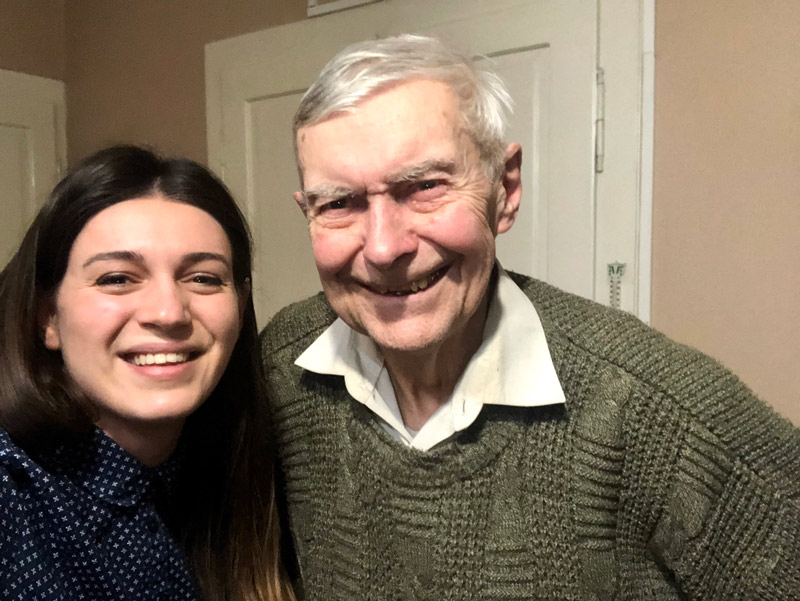
Oleh Panchuk was interviewed by Evgenia Lopata, who works as a cultural manager and translator in Chernivtsi.
Interview Highlights
On school
Lopata: You were born in Chernivtsi. It was still a part of Romania in those days.
Panchuk: Yes, when I went to school, classes were of course taught in Romanian. It was only later in the 1930s after the shift of power in Bucharest that the attitude toward minorities such as Ukrainians, Germans and Poles started to change. During my childhood, conditions for Ukrainians were harsh: languages other than Romanian were forbidden in public institutions, including schools. Once, during a school break, I was sitting at a desk with my neighbour who was also Ukrainian. We were whispering to each other in Ukrainian. Someone heard us and told the teacher. I was punished, rather symbolically though — I was hit five times on my palm with a ruler. It didn’t hurt, but it was humiliating. This was when I realised how important it is to let people speak their native language.
On political awareness
Let me tell you about an interesting anecote: Two days after Soviet troops entered the city, on the 23rd [of June 1940], a Soviet delegation, the party leadership and members of the military came to our house with flowers. Olha was carried to the sofa in the big room. She could barely speak. The officers talked about liberation and she was only nodding. This is when it all began: delegations from different cities and republics were coming to congratulate us on the liberation every day.
One evening, at a dinner to celebrate my father’s promotion as the head of the university library, a representative of the Local Party Committee approched my father: “How are you? Are you satisfied with how the Soviet authorities treat Olha Kobylianska?”. Questions of this sort were unexpected. So this representative gets to the point and says: “It’s been a month and a half since the liberation and we are a little surprised as to why Olha Kobylianskaya does not respond publicly to it”. Father begins to fudge and explains that she is paralysed. “Well, yes, but you could prompt her. She didn’t say thank you to the great Stalin, although she could do it personally. That’s how it is done. All our victories are victories under the leadership of Stalin”. My father fudged again replying that she’s really paralysed. But he was told: “You’d better think about how you could it anyway”. [….] We didn’t have any other choice, you see? Rejection would have led to a catastrophe. [Yet,] acquiescing meant giving up all our beliefs. Eventually, father met with that man again and said: “We have no right to refuse, but we are afraid to make a mistake, please write it by yourself, and we will give it to Kobylianska for her signature”. That’s what they did. To maintain some morality. This letter was given to Olha, she herself was not able to write, but there had to be a signature. Olha asked what those papers were. She was told that those were some domestic economic matters.
That’s how the first greeting appeared. They demanded more and more greetings on a monthly basis: “Olha Kobylianska congratulates some Uzbek writer on his anniversary and does not forget to say how thankful she is to the Soviet authorities” et cetera. We’ve collected some 30 letters of this kind in the course of one year.
On the Maidan protests
Lopata: You have seen so many regimes and political forces come and go, what kind of guidance would you give to the younger generation?
Panchuk: I think things are going well. You and thousands of people like you are out there and take action on your own initiative. You have not been coerced or bribed by anyone. And this gives impetus and motivation to the rest. We have to feel happy that things happened the way they did. Everything was hanging by a thread for a while, for example in those days of 2014, when Moscow advised Yanukovych to simply send tanks to the Maidan. Putin would do it. Yanukovych was afraid of the consequences, perhaps there was still some humanity left in him. I do not know the reason why it didn’t happen. That could have been the end. The best of the nation’s youth could have died on the Maidan. We were hanging by a thread and we survived.
On the future
Lopata: Does Ukraine have a future in Europe?
Panchuk: You know, it is a debatable question. I refuse to give predictions. Europeans would obviously want to have Ukraine. Something like France but in the East. At least, something like Poland. However, it is too hard to сhange our people, especially middle-aged and older generations. The majority will remain of the same mindset. People will remain passive because the Soviet power made them accustomed to it. Romania and Poland quickly got over it, but our parents still taught us to „keep quiet, otherwise I’ll have problems“. Today it has changed. There has never been such freedom of speech in Ukraine like today.
